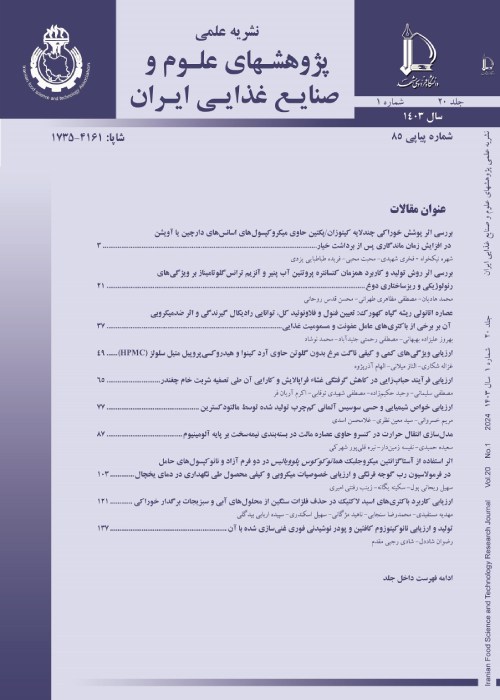The effects of alcalase prepared silver carp (Hypophthalmichthys molitrix) skin hydrolysate on some quality features and oxidative stability of microencapsulated Kilka fish oil
Considerable amounts of essential fatty acids in fish oil makes it possible to use in the production of functional foods to meet nutritional needs and beneficial effects on health. One of the major problems is their high susceptibility to oxidative deterioration and consequent production of undesirable flavor. At present, some synthetic compounds are used as antioxidants in food and biological systems, but the use of synthetic antioxidants is of concern due to their potential health hazards. Therefore, the use of natural antioxidants in foods is the first choice. Enzymatic protein hydrolysis has been applied to food industry by-products to produce foods with enhanced functional properties. Antioxidant and antiradical activity of protein hydrolysates from meat, skin, bone, viscera and roes of various aquatic species has been reported. Silver carp (Hypophthalmichthys molitrix) skin (SCS), as low price by-product from minced products processing plants is available in I.R. Iran. Amino acids composition and sequencing determines the functional properties of peptides, which depends on the source of protein, the method and conditions of preparation and molecular weight distribution of resulting hydrolysate. The enzyme type and hydrolysis conditions, including enzyme/substrate ratio, temperature, time and pH, can affect the peptides length and functional properties of protein hydrolysates. The effects of hydrolysate from SCS hydrolyzed by alcalase on some quality features and oxidative stability of microencapsulated Kilka (Clupeonella spp.) oil at pH 6.8 and 3.4 were investigated.
SCS was pre-treated with NaOH and acetic acid, washed and freeze dried. Proteolysis with alcalase (1% w/w) at 50 ºC, without pH adjustment, was performed for 4 hours with gentle stirring. Enzyme inactivated by placing the sample in a boiling water bath for 15 minutes. After centrifugation at 13000 g for 20 minutes, supernatant was removed as silver carp skin hydrolysate (SCSH) and freez dried. Emulsions were prepared with 31.25% dry material. 25% of wall materials (equal proportions of maltodextrin and Hi-Cap®100), fish oil 25% and SCSH (for preparing 1, 2, 3, 4 and 5 mg/mL treatments) in two adjusted pH 3.4 and 6.8, was used. Fish oil was refined using multi-layered column chromatography (alumina-silica gel), and fatty acid composition was determined. The emulsion pre-homogenized by the IKA Ultra-turrax at 15,000 rpm for 2 minutes and finally by a HSTO homogenizer at 350 bar for 5 circle, to produce microemulsion. Effects of treatments on the characteristics and oxidative stability of microencapsulated Kilka oil for 28 days in the dark at 45 ºC were compared by determination of surface oil, microencapsulation efficiency, free oil, emulsion stability (%separation), droplet size, optical microscopic observation of morphology and peroxidation stability.
Results showed significant differences between proximate composition of silver carp skin, before and after pre-treatment and revealed that applied method and conditions reduced the amounts of oil and ash to an acceptable level. No aggregation and cluster formation was observed in optical microscopic images of prepared emulsions. The effects of pH on the droplet size and microencapsulation efficiency were insignificant (p> 0.05), but the amount of free oil and emulsion stability were significant at ≥2 mg/mL concentrations of hydrolysate (p<0.05). Peptides effectively retarded the preoxidation of Kilka oil in the model system. Hydrolysate antioxidant power was dose dependent. Peroxidation trends were nonlinear for control and 1-4 mg/mL treatments. These trends continued linearly, with mild slope for 5 mg/mL, and was similar for 2 pH during 28 days. Hydrolysate of SCS may be used as a natural antioxidant for the production of stable microencapsulated fish oil for the enrichment of various kinds of beverages with a wide range of pH.
- حق عضویت دریافتی صرف حمایت از نشریات عضو و نگهداری، تکمیل و توسعه مگیران میشود.
- پرداخت حق اشتراک و دانلود مقالات اجازه بازنشر آن در سایر رسانههای چاپی و دیجیتال را به کاربر نمیدهد.


